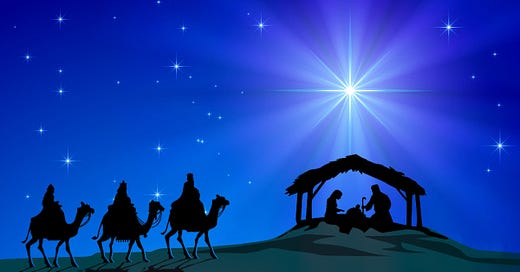Have you ever become so familiar with something that you no longer see it? Or maybe you see it, but you lose the sense of its significance. We are in Epiphanytide. We celebrated Epiphany on Sunday, January 5, even though Epiphany is the next day (6th). This is the day we remember the Magi from the east arriving in Bethlehem to adore the Christ Child.
During this week I have been reflecting on Matthew 2:1–12, the Gospel passage that describes this important event.
When Jesus was born in Bethlehem of Judea, in the days of King Herod, behold, magi from the east arrived in Jerusalem, saying, “Where is the newborn king of the Jews? We saw his star at its rising and have come to do him homage.” When King Herod heard this, he was greatly troubled, and all Jerusalem with him. Assembling all the chief priests and the scribes of the people, he inquired of them where the Messiah was to be born. They said to him, “In Bethlehem of Judea, for thus it has been written through the prophet:
‘And you, Bethlehem, land of Judah,
are by no means least among the rulers of Judah;
since from you shall come a ruler,
who is to shepherd my people Israel.’”Then Herod called the magi secretly and ascertained from them the time of the star’s appearance. He sent them to Bethlehem and said, “Go and search diligently for the child. When you have found him, bring me word, that I too may go and do him homage.” After their audience with the king they set out. And behold, the star that they had seen at its rising preceded them, until it came and stopped over the place where the child was. They were overjoyed at seeing the star, and on entering the house they saw the child with Mary his mother. They prostrated themselves and did him homage. Then they opened their treasures and offered him gifts of gold, frankincense, and myrrh. And having been warned in a dream not to return to Herod, they departed for their country by another way.
I am seeing something I never noticed before. When the Magi arrive in Jerusalem to the court of King Herod, where no doubt they expected to find the newborn king of the Jews, Herod understandably is greatly troubled. There has been no royal births in his castle. He immediately assembles the religious leaders, the chief priest and the scribes. And notice that he asks them where the Messiah (Christ) was to be born.
One thing I notice is that even Herod was aware of the Messiah and so he went to the people who should know best what the Scriptures said regarding him. And sure enough they did. They immediately pointed him to the prophecy in Micah (5:1–3) that foretold that the Messiah would be born in Bethlehem, and that he would be a ruler and a shepherd to the people of Israel.
But Herod saw this Messiah as a threat and we know how he plotted to exterminate him. We know the chief priests and scribes knew about Messiah, but they seemed to lose their institutional memory when this same Messiah began his public ministry and announced the arrival of the Kingdom of God. A mere 30 years later they too are seeking a way to exterminate him.
Then there are the magi. We don’t know that much about them except that they were from the east, that they studied the stars, and that they were not Jews. They came to Jerusalem and then Bethlehem with open hearts and with the intention of paying homage to this newborn king. When they saw the Christ Child they prostrated themselves and adored him. They offered him gifts worthy of a king.
And after being warned in a dream they did not fall prey to Herod’s plot. They departed for their country by another way. On Sunday, our priest in his homily pointed out that in not going back the same way they came there is indication of their conversion. They had a change of heart and mind. That is what should happen every time we encounter the Christ. Unlike Herod and the Jewish religious leaders, they saw the Christ, they worshiped and their lives were changed.
How often do I (and you) encounter Christ in Scripture, in the Sacraments, in another brother or sister, or in the poor, and miss the forest for the trees. We hear God’s Word, we receive the Sacrament (Eucharist, absolution or anointing), we worship and fellowship with fellow Christians, or we see someone who is truly in need, and it all just blends into our daily life. We miss the epiphany! We miss the manifestation of the divine!
A simple practice that I have adopted from the life of St. Thomas the Apostle is to adore the Christ in the moment of the elevation of the Host in the Liturgy of the Eucharist. With him I silently worship saying, “My Lord and my God!”
May we like the Magi keep pursuing Christ, ready and willing to prostrate ourselves before Him, adore Him, and offer Him our finest gifts. That’s the bottom line.
Image by Parade




